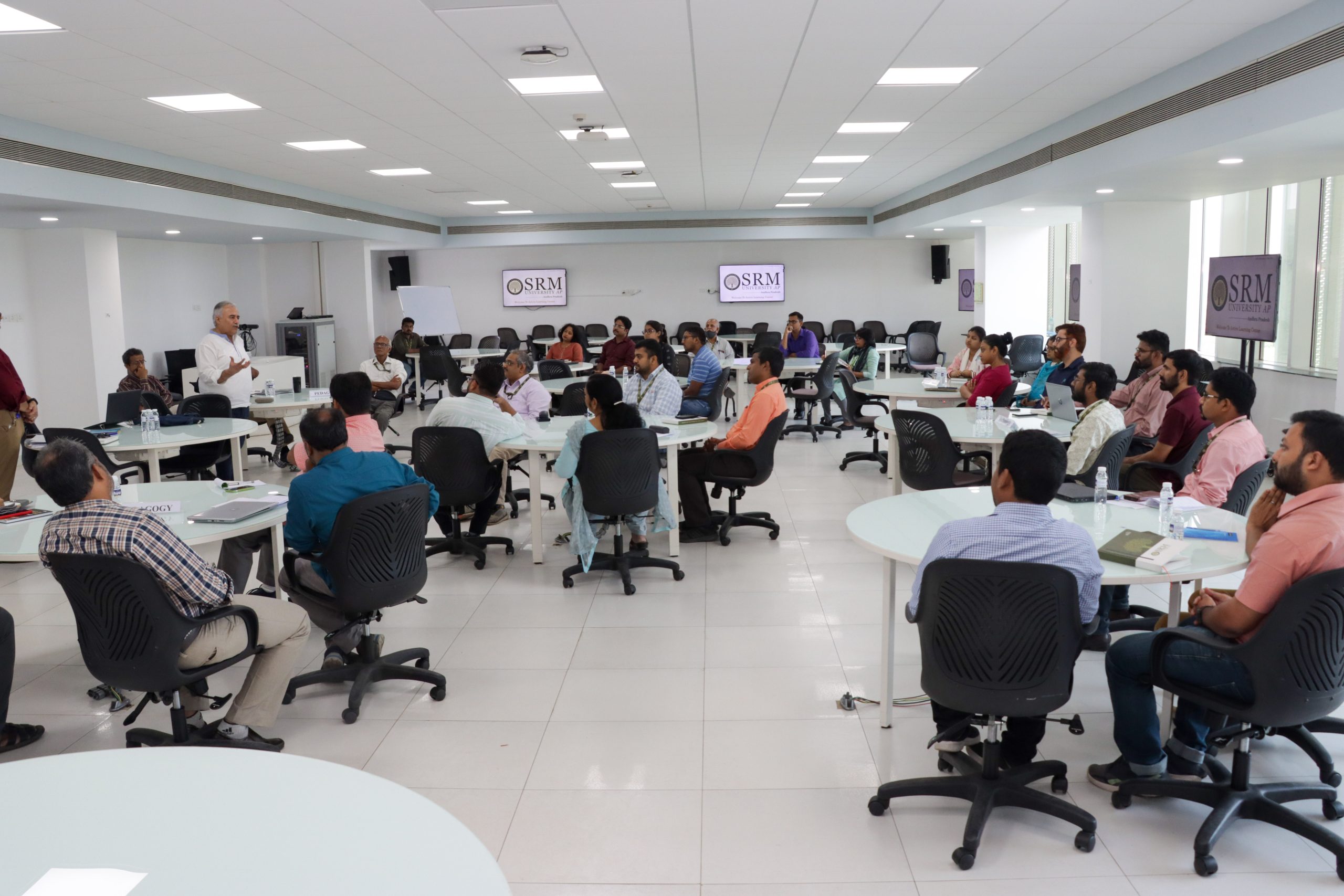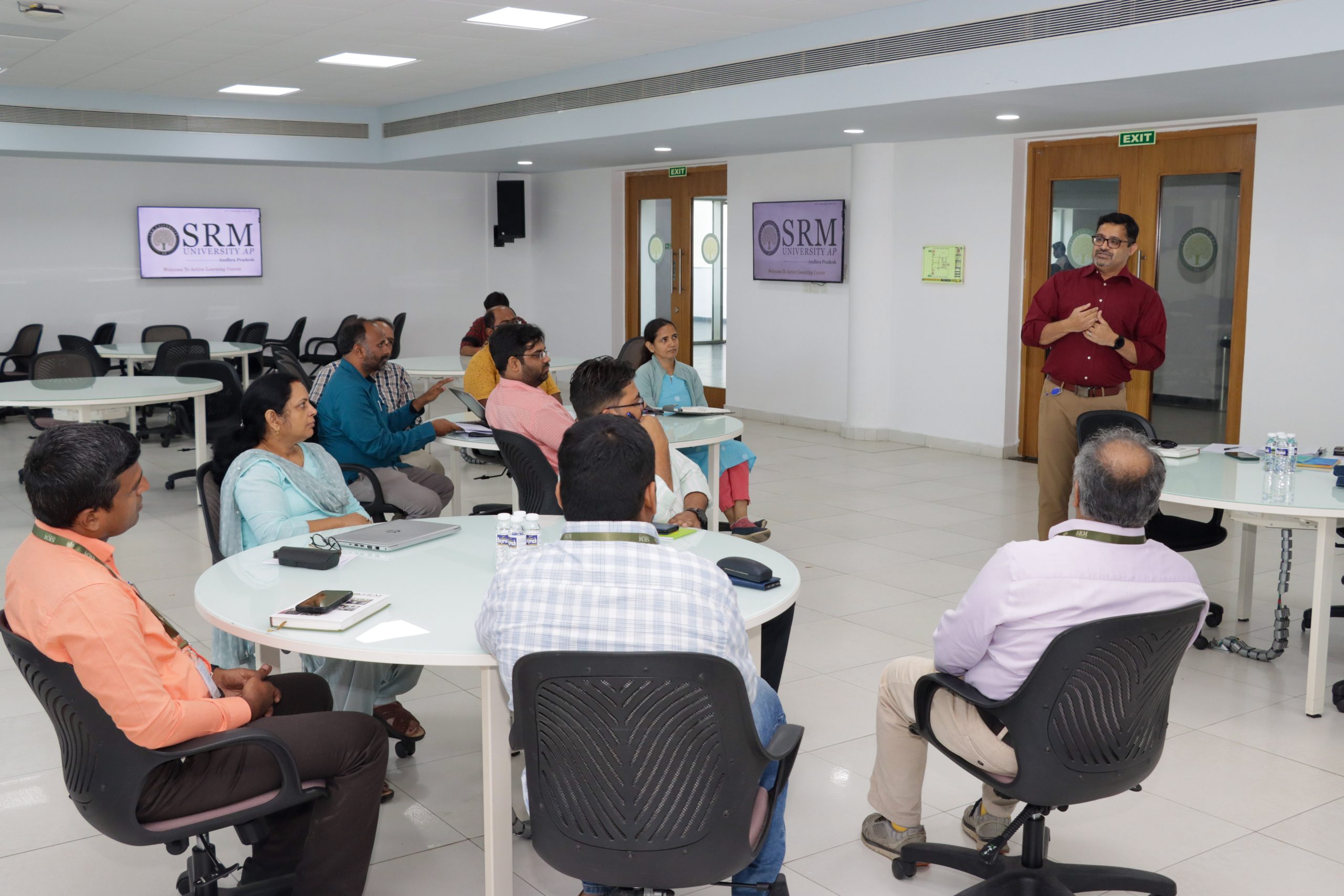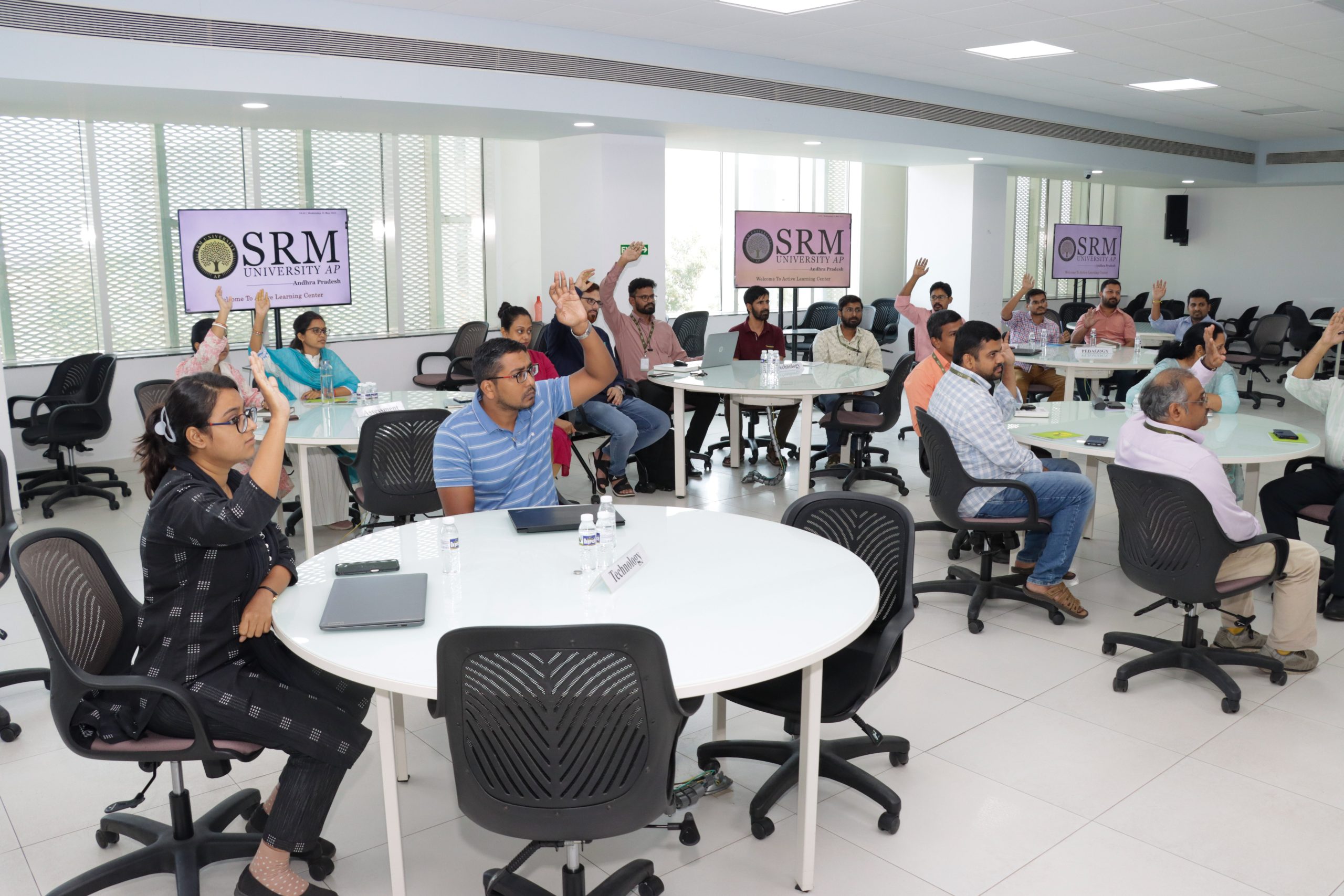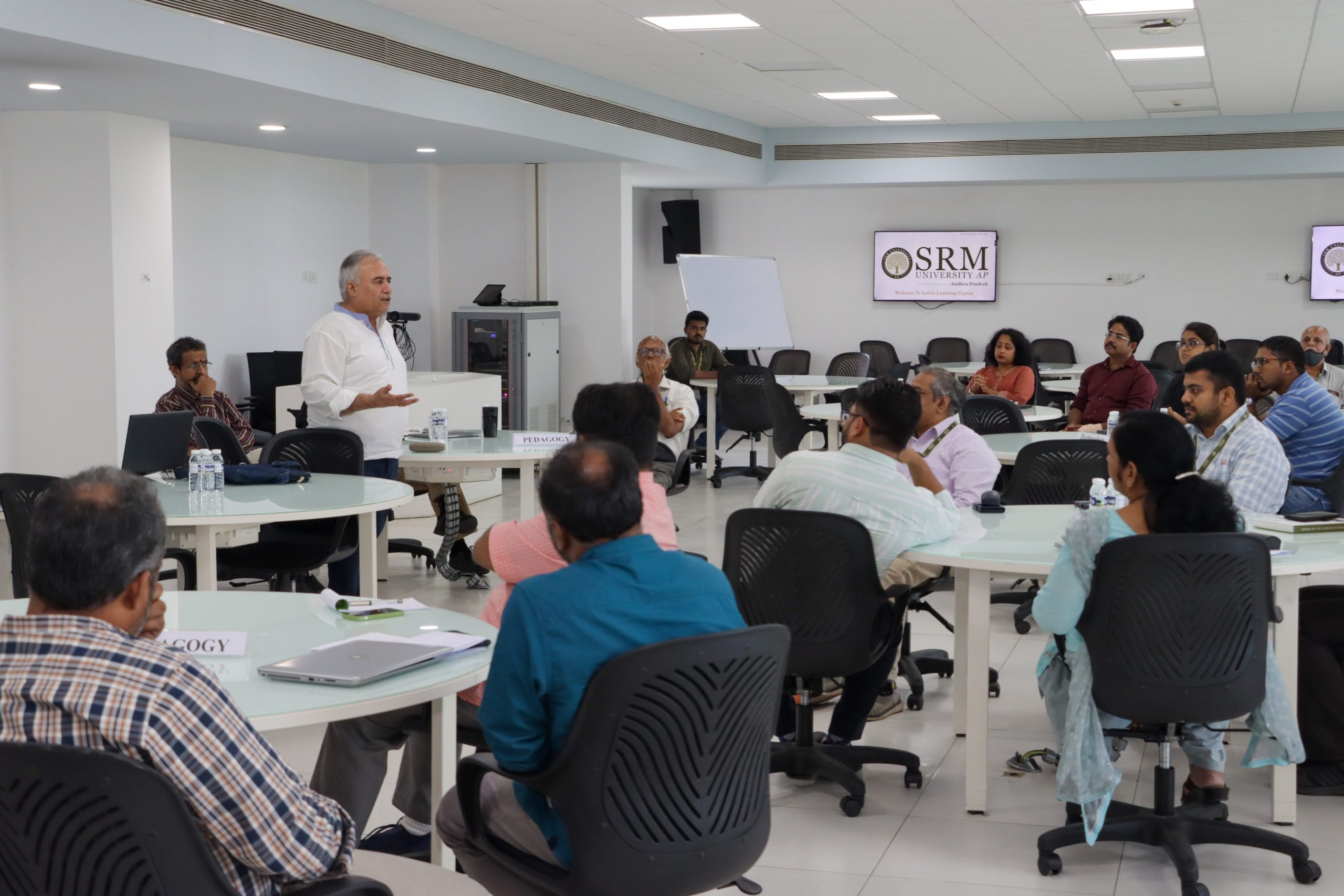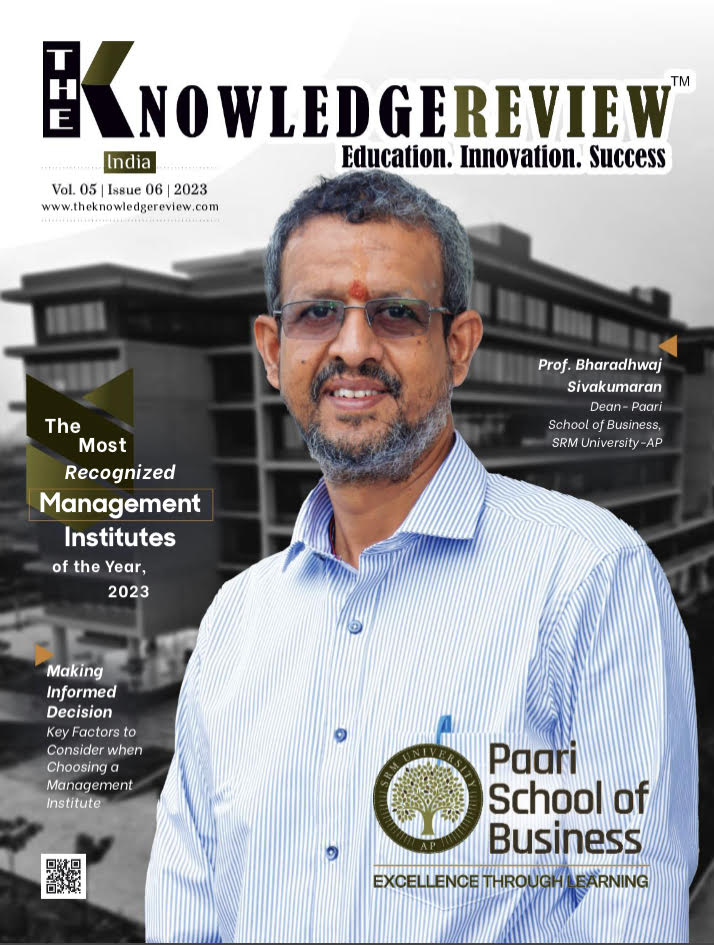All Management News
- Dr Repaka Subha Sandeep June 5, 2023
- Economics Students Admitted to Esteemed Global Universities June 2, 2023
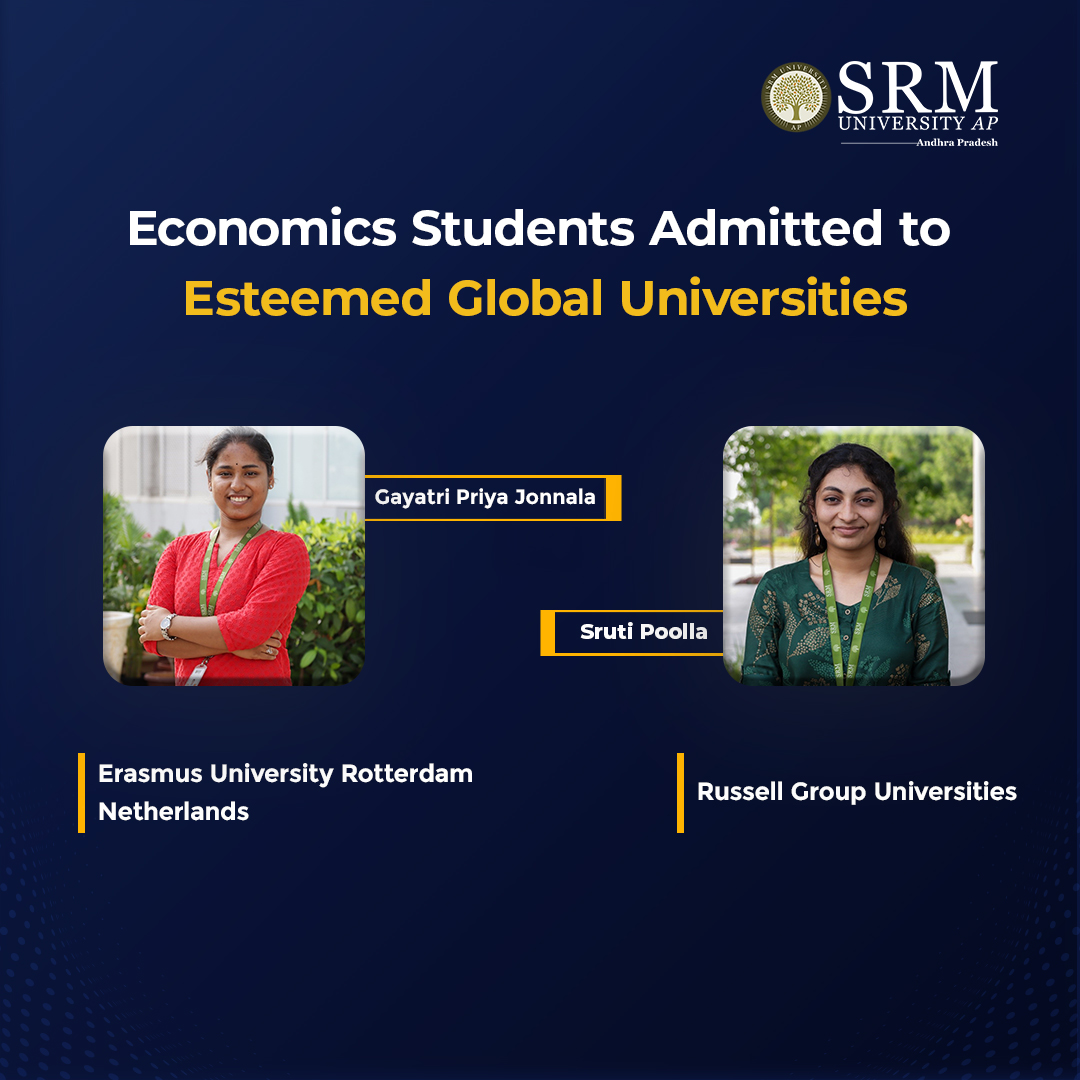 Getting into one of the global universities of great repute is an impactful motivation for every aspiring student to accomplish even greater things. It opens the gateway to a promising career they have been passionately dreaming of. Two exceptional students from the Department of Economics have been offered admission to highly esteemed international higher education institutions. Gayatri and Sruti, the final year Economics students of SRM University-AP, have been accepted into the Erasmus University Rotterdam, Netherlands, and the Russell Group Universities.
Getting into one of the global universities of great repute is an impactful motivation for every aspiring student to accomplish even greater things. It opens the gateway to a promising career they have been passionately dreaming of. Two exceptional students from the Department of Economics have been offered admission to highly esteemed international higher education institutions. Gayatri and Sruti, the final year Economics students of SRM University-AP, have been accepted into the Erasmus University Rotterdam, Netherlands, and the Russell Group Universities.Ms Gayatri Jonnala was ecstatic while reading the offer letter to study MSc at a leading global university. She has been accepted into the Erasmus School of Economics at Erasmus University Rotterdam, Netherlands, an institution among the QS top 50 universities.
‘‘The curriculum at SRM University-AP is very similar to the requirements of a Master’s in Economics abroad. Taking part in co-curricular and extracurricular activities helps build a holistic statement of purpose. The reading material in the library for the English proficiency tests was adequate for good preparation’’, said Gayathri while elaborating on her learning experiences at the campus.
Ms Sruti Poolla was shocked and delighted to receive her offer letters from the world-renowned Russell Group Universities. She chose the University of Birmingham from the list of universities she has gotten accepted into. The Russell Group universities are known to be research intensive and very hard to get into because of their competitiveness. It is among the world’s top 100 universities, according to QS Ranking.
‘‘There was not much preparation I did. I had to write an English proficiency exam for which I prepared. The other aspects for admission were a statement of purpose, a letter of reference from my professors and my college transcripts. I can say that I have had good grades since my first semester, and my professors encouraged and trusted me enough to say good things in my LOR. The experience I’ve gained in my three years at SRM University-AP formed a good SOP for me to get accepted,” said Sruti while asked about her preparation strategy.
Sruti and Gayatri shared how the faculty of SRM University-AP have been very enthusiastic to know about their future plans and constantly encouraged all students to choose the right career option. The varsity’s curriculum has improved the students’ knowledge in various subjects, which will only be an advantage for them while pursuing further education. Sruti extended her gratitude to the Dean-Liberal Arts and Social Sciences and all the faculty at the Department of Economics.
‘‘My dissertation supervisor, Dr Manzoor Hassan Malik and Prof. Bandi Kamaiah, provided continuous guidance and support to receive the offer letter from a prestigious university, for which I’m very thankful,’’ added Gayatri.
Both look forward to a bright future after completing their master’s at reputed global universities.
Continue reading → - A Thematic Study on Green Finance June 2, 2023
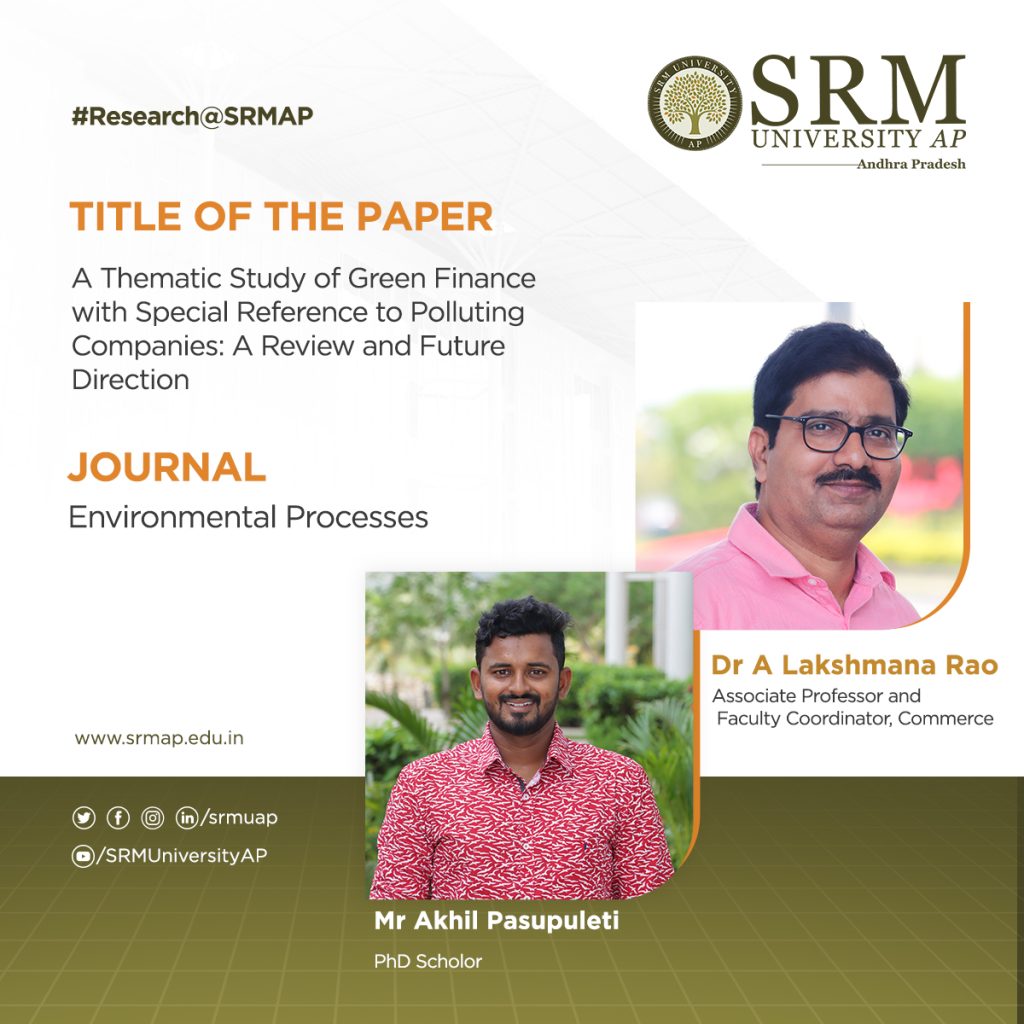 Today, we live in a world where sustainability and sustainable development are the need of the hour and amidst this, Associate Professor, Dr A Lakshmana Rao and Research Scholar, Mr Akhil Pasupuleti from the Department of Commerce have come up with their pacesetting research publication titled – “A Thematic Study of Green Finance with Special Reference to Polluting Companies: A Review and Future Direction.” The research work gives an impetus to many polluting companies to adopt green finance as an option to combat environmental pollution, this can be in the form of business strategy, energy saving, green credit, and innovation.
Today, we live in a world where sustainability and sustainable development are the need of the hour and amidst this, Associate Professor, Dr A Lakshmana Rao and Research Scholar, Mr Akhil Pasupuleti from the Department of Commerce have come up with their pacesetting research publication titled – “A Thematic Study of Green Finance with Special Reference to Polluting Companies: A Review and Future Direction.” The research work gives an impetus to many polluting companies to adopt green finance as an option to combat environmental pollution, this can be in the form of business strategy, energy saving, green credit, and innovation.Abstract
The objective of the study was to understand the phenomenon of green finance in polluting companies through a systematic literature review. The methodology involves the search, selection, classification, and categorisation of thirty-five articles on green finance in polluting companies which were analysed for the time span of eleven years, i.e., 2011–2022. The outcome of the review identified the following five themes: (i) green credit and environmental protection; (ii) green finance and green innovation; (iii) green innovation and environmental protection; (iv) green finance and investment; and (v) green innovation and firm performance. The review has put forward recommendations for further advancement in policy strengthening and the utilisation of extensive data analysis, indicating potential avenues for future research and development. The findings of the study provide insights to researchers, practitioners, and policymakers about the status of green finance in polluting companies.
Dr Lakshmana Rao Ayyagari and his student Mr Akhil Pasupuleti are working on developing future prospects of Green Finance such as ESG disclosure and reporting practices, its application and the relationship of CSR and sustainability.
Continue reading → - Market Integration of Chickpea Crop in India June 2, 2023
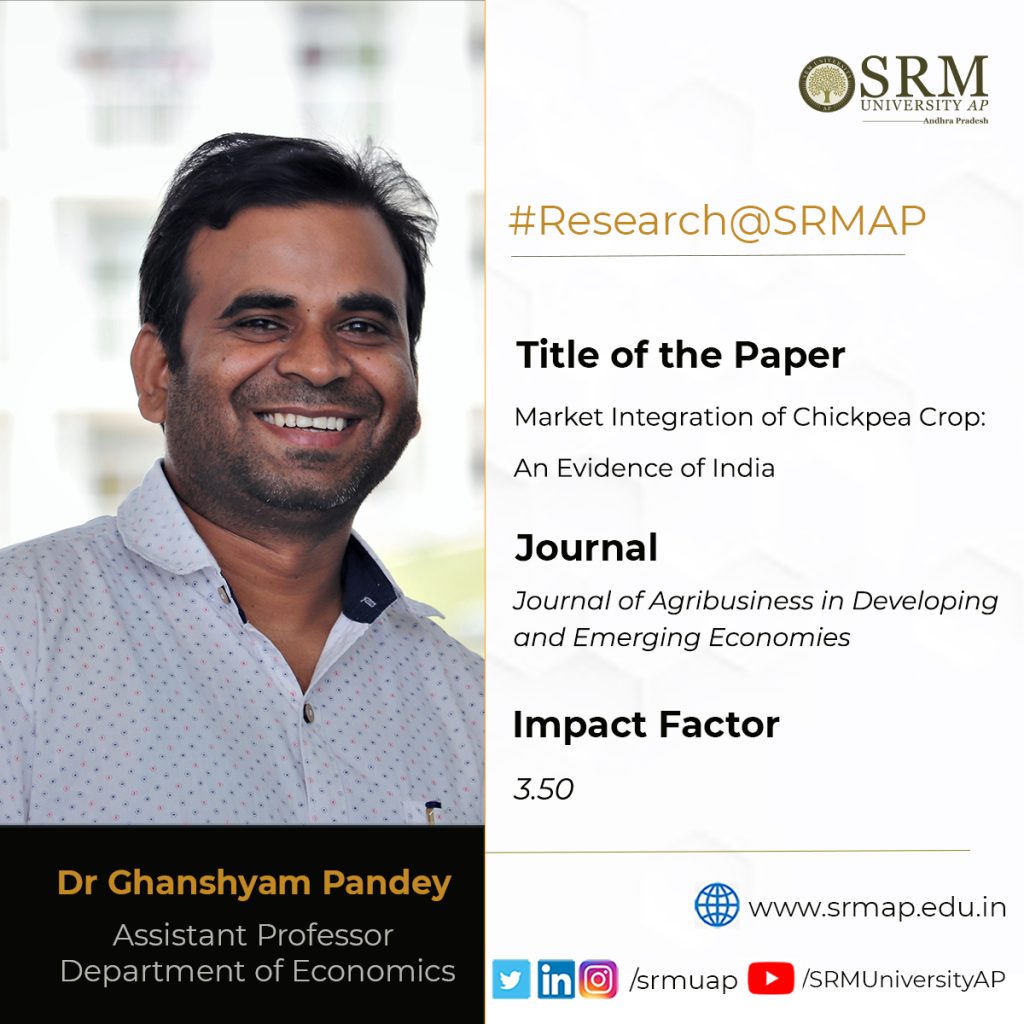
Dr Ghanshyam Kumar Pandey, Assistant Professor, Department of Economics has published a paper titled “Market Integration of Chickpea Crop: An Evidence of India”, in the esteemed Q1 Journal, Journal of Agribusiness in Developing and Emerging Economies having an impact factor of 3.50. Through this paper, Dr Pandey analyses the integration and direction of causality of prices of chickpea produce in the markets of India.
Abstract
Purpose – The purpose of this paper is to examine the market integration and direction of causality of wholesale and retail prices for chickpea legumes in major chickpea markets in India.
Design/methodology/approach – In this paper, the authors have employed the Johansen co-integration test, Granger causality test, vector autoregression (VAR), and vector error correction model (VECM) to examine the integration of markets. The authors use monthly wholesale and retail price data of the chickpea crop from select markets in India spanning January 2003–December 2020.
Findings – The results of this study strongly confirm the co-integration and interdependency of the selected chickpea markets in India. However, the speed of adjustment of prices in the wholesale market is weakest in Bikaner, followed by Daryapur and Narsinghpur; it is relatively moderate in Gulbarga. In contrast, the speed of adjustment is negative for Bhopal and Delhi, weak for Nasik, and moderate for retail market prices in Bangalore. The results of the causality test show that the Narsinghpur, Daryapur, and Gulbarga markets are the most influential, with bidirectional relations in the case of wholesale market prices. Meanwhile, the Bangalore market is the most connected and effective retail market among the selected retail markets. It has bidirectional price transmission with two other markets, i.e., Bhopal and Nasik.
Research limitations/implications – This paper calls for forthcoming studies to investigate the impact of external and internal factors, such as market infrastructure; government policy regarding self-reliant production; product physical characteristics; and rate of utilisation indicating market integration. They should also focus on strengthening information technology for the regular flow of market information to help farmers increase their incomes. Very few studies have explored market efficiency and direction of causality using both linear and nonlinear techniques for wholesale and retail prices of chickpeas in India.
Continue reading →
- Careers in Molecular Biology and Biotechnology-srmap June 1, 2023
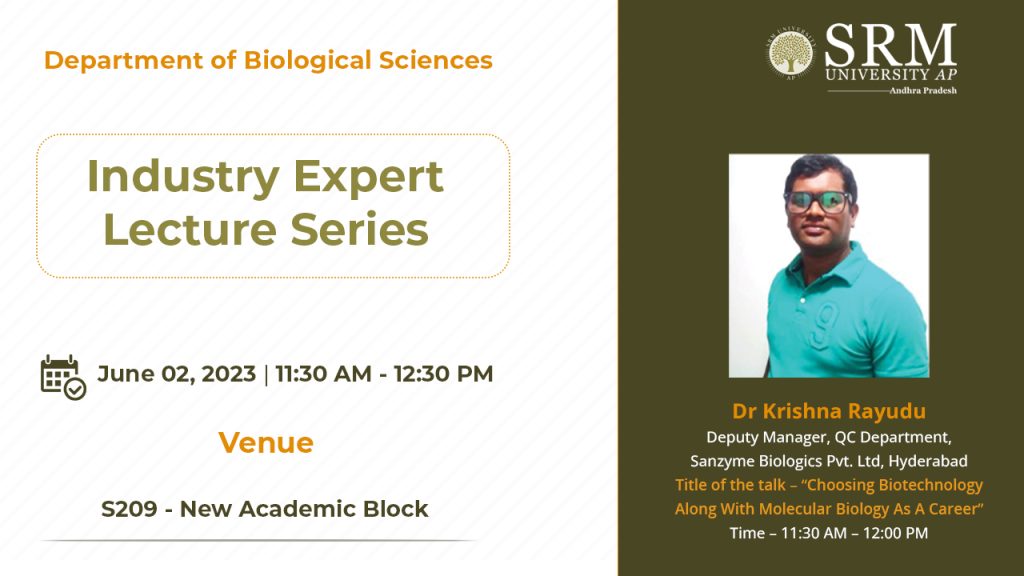
The Department of Biological Sciences is organising an Industry Expert Lecture Series featuring talks from industry experts from various domains of biology. As part of the series, a lecture titled “Choosing Biotechnology along with Molecular Biology as a Career” will be delivered by Dr Krishna Rayudu from Sanzyme Biologics Pvt. Ltd. on June 02, 2023. The talk will highlight industry expectations and skill development for BSc, MSc, and PhD students to enter into Biotech Industries.
Join the session to gain insight into the scope and opportunities for a successful career in the Biotech industry!
Continue reading → - Raman Signals Emitted by Pathogenic Vibrio Microorganisms and Purine Metabolites: A Comprehensive Analysis June 1, 2023
Dr Rajapandiyan Panneerselvam, Assistant Professor, Department of Chemistry, and his team have developed a method using a portable Raman spectrometer to quickly identify six common pathogenic Vibrio species that can contaminate seafood. His latest research paper Intelligent convolution neural network-assisted SERS to realise highly accurate identification of six pathogenic Vibrio, has been published in the Q1 Nature Index journal Chemical Communications, having an Impact Factor of 6.0.
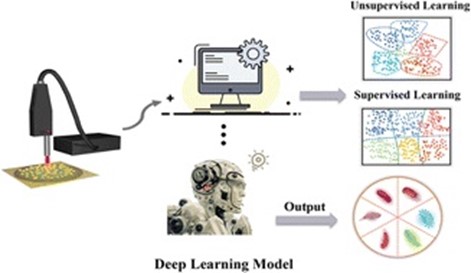 By using gold-silver nanoparticles, the study was able to accurately detect these harmful microorganisms. The new deep learning model called a convolutional neural network (CNN), outperformed traditional machine learning methods with a classification accuracy of 99.7%. The entire identification process only took 15 minutes. The researchers also discovered that the Raman signals emitted by Vibrio species are similar to signals from certain substances found in purine degradation, such as uric acid and adenine. This knowledge helps them explain why different Vibrio species produce slightly different Raman signals. Overall, the CNN-assisted Raman spectroscopy method offers a fast and accurate way to diagnose and identify harmful microorganisms responsible for food contamination.
By using gold-silver nanoparticles, the study was able to accurately detect these harmful microorganisms. The new deep learning model called a convolutional neural network (CNN), outperformed traditional machine learning methods with a classification accuracy of 99.7%. The entire identification process only took 15 minutes. The researchers also discovered that the Raman signals emitted by Vibrio species are similar to signals from certain substances found in purine degradation, such as uric acid and adenine. This knowledge helps them explain why different Vibrio species produce slightly different Raman signals. Overall, the CNN-assisted Raman spectroscopy method offers a fast and accurate way to diagnose and identify harmful microorganisms responsible for food contamination.Abstract
The utilisation of label-free Surface-Enhanced Raman Spectroscopy (SERS) technology enabled a comprehensive analysis of the connection between Raman signals emitted by pathogenic Vibrio microorganisms and purine metabolites. Through extensive research, a sophisticated Convolutional Neural Network (CNN) model was developed, demonstrating exceptional performance with an accuracy rate of 99.7% in the rapid identification of six common pathogenic Vibrio species within a mere 15-minute timeframe. This breakthrough offers a groundbreaking approach to pathogen identification, introducing a novel and efficient method to the field.
Practical Implementation of the Research
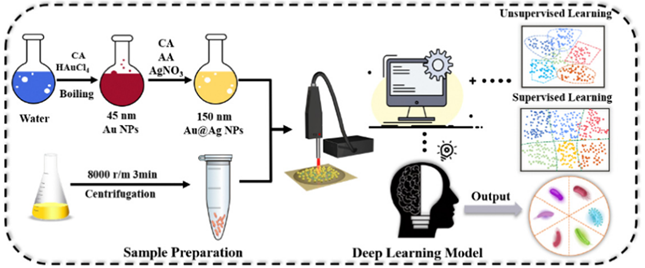 The practical implementation of label-free SERS technology combined with a deep learning CNN model enables rapid and accurate identification of pathogenic Vibrio microorganisms. This has important social implications, including improving public health and safety by quickly identifying and controlling outbreaks, enhancing food safety measures, and enabling real-time pathogen detection in resource-limited areas. The method’s speed and accuracy contribute to more informed decision-making, mitigating the spread of infectious diseases and ultimately creating a safer society.
The practical implementation of label-free SERS technology combined with a deep learning CNN model enables rapid and accurate identification of pathogenic Vibrio microorganisms. This has important social implications, including improving public health and safety by quickly identifying and controlling outbreaks, enhancing food safety measures, and enabling real-time pathogen detection in resource-limited areas. The method’s speed and accuracy contribute to more informed decision-making, mitigating the spread of infectious diseases and ultimately creating a safer society.Future Research Plans
Moving forward, future work in the field of label-free SERS technology for pathogen identification could focus on expanding the coverage to include a wider range of Vibrio species, increasing the diversity of the dataset used for training, conducting rigorous cross-validation and external validation studies, exploring integration with portable SERS devices for on-site detection, optimising the deep learning model for speed and efficiency, and investigating clinical and environmental applications. By pursuing these avenues, the research can further enhance the versatility, reliability, and real-world applicability of the method, leading to improved methods for rapid and accurate pathogen identification in various domains.
Collaborations
- Dr Jianfeng Li (College of Materials, State Key Laboratory for Physical Chemistry of Solid Surfaces, College of Chemistry and Chemical Engineering, College of Energy, School of Aerospace Engineering, Xiamen University, Xiamen 361005, China)
- Dr Lin Zhang (State Key Laboratory of NBC Protection for Civilian, Beijing 102205, China)
- Dr Zehui Chen (Xiamen City Center for Disease Control and Prevention, Xiamen 361005, China)
- Problem-Solving as a 21st Century Skill: How can Indian HEIs help June 1, 2023
DNP Education
Continue reading →

Daily News Post India

- A Discourse on Teaching Practices May 31, 2023
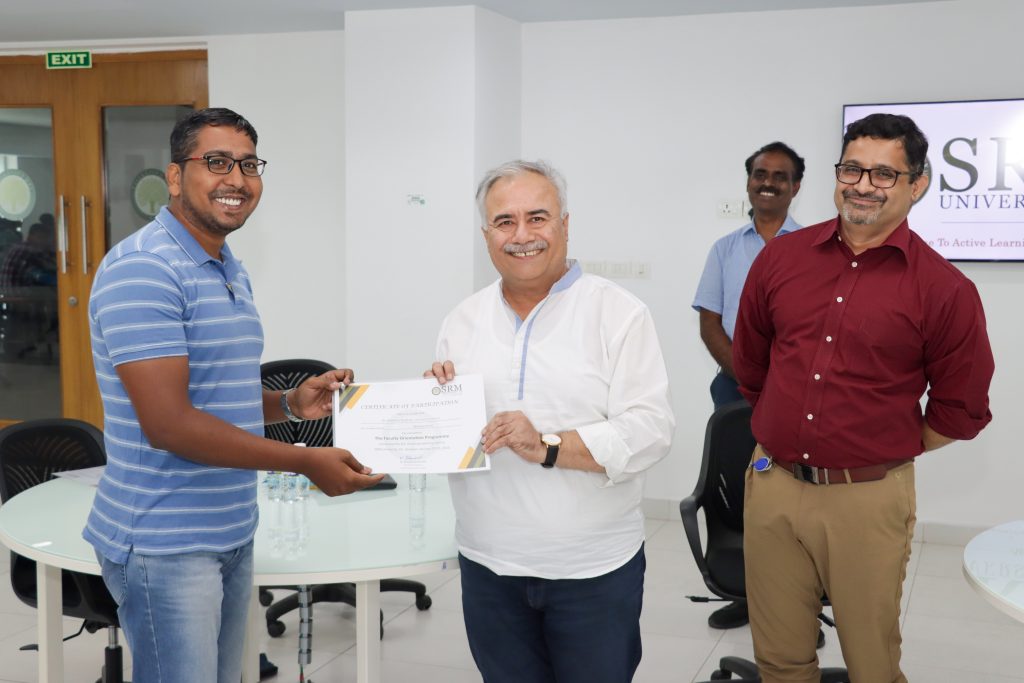
The Teaching Learning Centre at SRM University- AP enables the faculty and researchers to create a conducive environment for teaching and learning. The centre had organised a Teaching Process-Round Table Programme on May 31, 2023 for the faculty to discuss their best teaching practices and strategies in facilitating the students with a better experience.
Vice Chancellor, Prof. Manoj K Arora, Deans, Professors and other faculty members were in attendance. Prof. Arora, emphasised on the necessity of such interactive programmes. He called it a “360° feedback session from you, for you.” The programme also examined the ideas from the Faculty Development Programme conducted in January this year.
Practices like, Experiential learning, Active learning and Peer learning were the highlights of the session. Audio-Visual techniques, storytelling, case studies, Jigsaw technique and technology based learning were stressed upon to make the classes more engaging.
The session ended with Vice Chancellor, Prof. Manoj K Arora handing over certificates to the presenters.
Continue reading → - The Most Recognised Management Institutes of the Year 2023 May 31, 2023
- Understanding Women’s Under Representation in Indian Democracy May 30, 2023
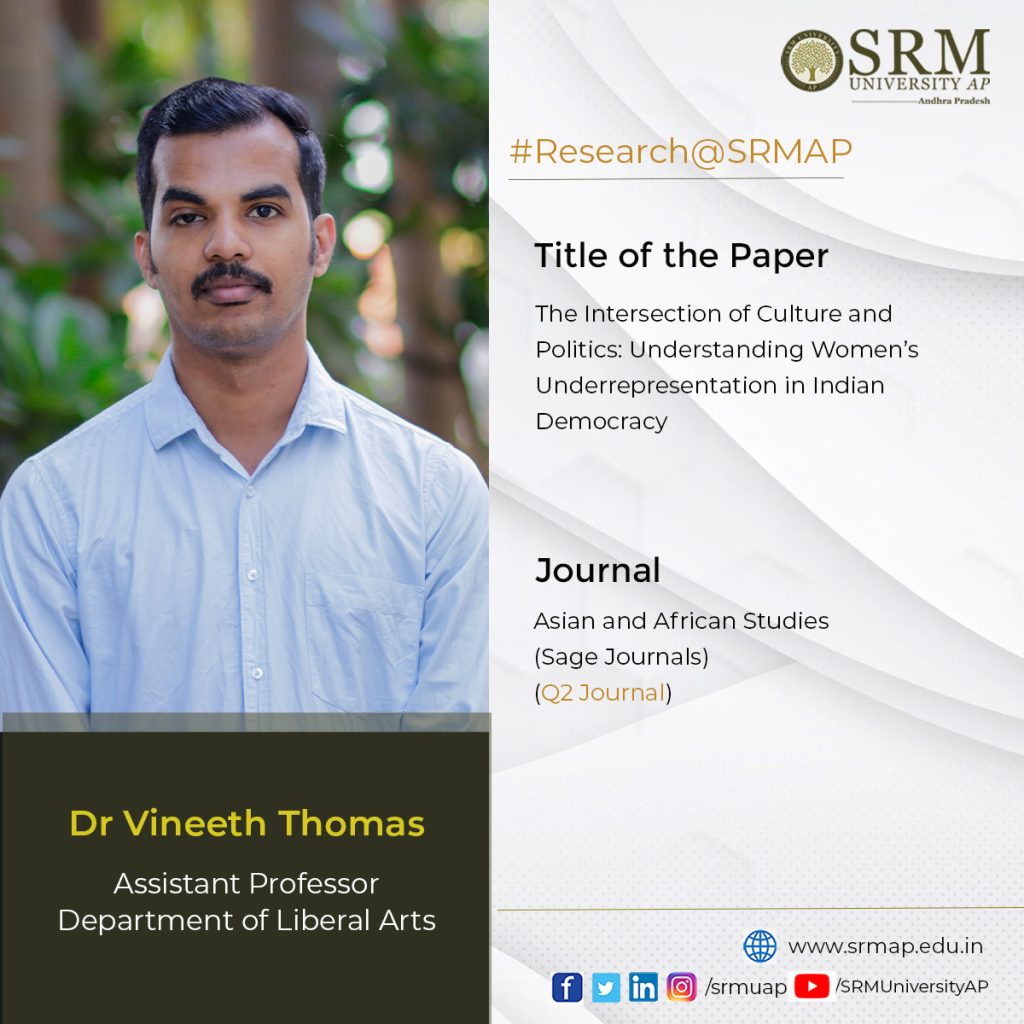
In an era where numerous policies and measures are taken to give women an equal footing with the rest of the world and where women shoulder equal responsibilities in the family and work front, the representation of women in Indian Politics still lags behind. Dr Vineeth Thomas, Assistant Professor, Department of Liberal Arts in his paper titled- “The Intersection of Culture and Politics: Understanding Women’s Under representation in Indian Democracy” in the Journal of Asian and African Studies – Sage Journals (Q2 Journal) has tried to comprehend the issue of women’s under representation in politics.
Abstract
The representation of women in Indian politics has been low and inadequate, with women comprising only 14.4% of the members of the seventeenth Lok Sabha. Despite numerous policy measures aimed at promoting women’s political representation, the under representation of women remains a persistent challenge. This study seeks to understand the intersection of culture and politics in explaining the under representation of women in Indian democracy. The findings suggest that a change in the civic political culture, through a multifaceted approach, is crucial in breaking down the glass ceiling in Indian politics.
Dr Vineeth Thomas is currently engaged in collaborative research works on Public relations, democracy and ethics, poverty in SAARC region and judicial delay in Indian high courts.
Continue reading →


